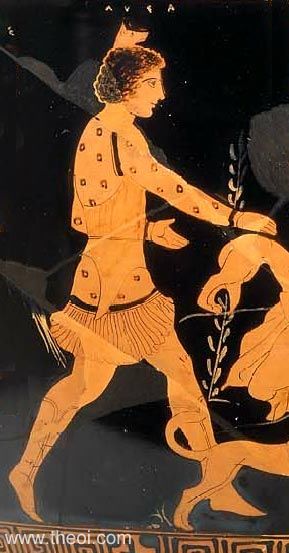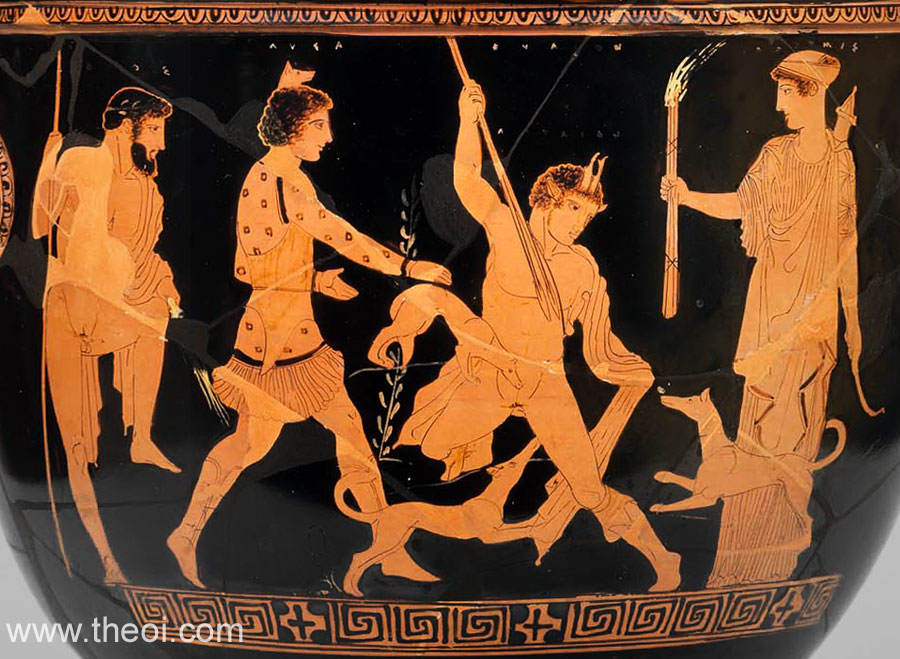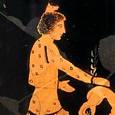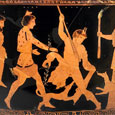LYSSA
Greek Name
Λυσσα Λυττα
Transliteration
Lyssa, Lytta
Roman Name
Ira, Furor, Rabies
Translation
Mad-Rage, Fury (lyssa)

LYSSA was the goddess or personified spirit (daimona) of mad rage, fury, crazed frenzy and, in animals, rabies. The Athenians spelt her name Lytta.
Lyssa was a figure of Athenian tragedy. In Aeschylus she appears as an agent of Dionysos sent to drive the Minyades mad, and in Euripides she is sent by Hera to inflict Herakles with madness. Greek vase-painting depicts her standing beside Aktaion (Actaeon) as he is torn apart by his maddened hounds. In this scene she appears as a women dressed in a short skirt and crowned with a dog's-head cap representing the madness of rabies.
Lyssa was closley related to the Maniai (Maniae), the goddesses of mania and madness. Her Roman equivalents were Ira, Furor and Rabies. Sometimes she was multiplied into a host of Irae and Furores.
FAMILY OF LYSSA
PARENTS
[1] NYX & the blood of OURANOS (Euripides Heracles 844)
[2] AETHER & GAIA (Hyginus Preface)
CLASSICAL LITERATURE QUOTES
LYSSA PERSONIFICATION OF MAD RAGE
Aeschylus, Fragment 85 Xantriae (from Photius, Lexicon 326. 22) (trans. Weir Smyth)
(Greek tragedy C5th B.C.) :
"[Lyssa speaks in a play describing the madness inflicted by Dionysos upon either the impious daughters of
Minyas or the Mainades (Maenads) who dismembered Pentheus :]
From the feet up the crown of the head steals the spasm, the stab of Lyssa (Frenzy), aye, the scorpion's
sting."
Euripides, Heracles 815 ff (trans. Vellacott) (Greek tragedy C5th B.C.) :
"[The spectres of Lyssa (Madness) and Iris appear from above. The Chorus sees them.]
Chorus : Ha! see there, my old comrades! is the same wild panic fallen on us all; what phantom is this I see
hovering over the house? Fly, fly, bestir your tardy steps! begone! away! O savior prince, avert calamity from
me!
Iris : Courage, old men! she, whom you see, is Lyssa (Madness), daughter of Nyx (Night), and I am Iris, the
handmaid of the gods. We have not come to do your city any hurt, but our warfare is against the house of one man
only, against him whom they call [Herakles (Heracles)] the son of Zeus and Alkmena (Alcmena). For until he had
finished all his grievous labors, Destiny was preserving him, nor would father Zeus ever suffer me or Hera to
harm him. But now that he has accomplished the labors of Eurystheus, Hera wishes to brand him with the guilt of
shedding kindred blood by slaying his own children, and I wish it also. Come then, unwed maid, child of black
Nyx (Night), harden your heart relentlessly, send forth frenzy upon this man, confound his mind even to the
slaying of his children, drive him, goad him wildly on his mad career, shake out the sails of death, that when
he has conveyed over Akheron's (Acheron's) ferry that fair group of children by his own murderous hand, he may
learn to know how fiercely against him the wrath of Hera burns and may also experience mine; otherwise, if he
should escape punishment, the gods will become as nothing, while man's power will grow.
Lyssa : Of noble parents was I born, the daughter of Nyx (Night), sprung from the blood of Ouranos (Uranus,
Heaven); and these prerogatives I hold, not to use them in anger against friends, nor do I have any joy in
visiting the homes of men; and I wish to counsel Hera, before I see her err, and you too, if you will hearken to
my words. This man, against whose house you are sending me, has made himself a name alike in heaven and earth;
for, after taming pathless wilds and raging sea, he by his single might raised up again the honors of the gods
when sinking before man's impiety; . . ((lacuna)) wherefore I counsel you, do not wish him dire mishaps.
Iris : Spare us your advice on Hera's and my schemes.
Lyssa : I seek to turn your steps into the best path instead of into this one of evil.
Iris : It was not to practice self-control that the wife of Zeus sent you here.
Lyssa :
I call Helios the sun-god to witness that here I am acting against my will; but if indeed I must at once serve
you and Hera and follow you in full cry as hounds follow the huntsman, then I will go; neither ocean with its
fiercely groaning waves, nor the earthquake, nor the thunderbolt with blast of agony shall be like the headlong
rush I will make into the breast of Herakles; through his roof will I burst my way and swoop upon his house,
after first slaying his children; nor shall their murderer know that he is killing the children he begot, till
he is released from my madness. Behold him! see how even now he is wildly tossing his head at the outset, and
rolling his eyes fiercely from side to side without a word; nor can he control his panting breath, like a
fearful bull in act to charge; he bellows, calling on the Keres of Tartaros. Soon will I rouse you to yet wilder
dancing and pipe a note of terror in your ear. Soar away, O Iris, to Olympos on your honored course; while I
unseen will steal into the halls of Herakles.
Choru s: Alas alas! lament; the son of Zeus, flower of your city, is being cut down. Woe to you, Hellas! that
will cast from you your benefactor, and destroy him as he dances in the shrill frenzy of Lyssa (Madness). She is
mounted on her chariot, the queen of sorrow and sighing, and is goading on her steeds, as if for outrage, the
Gorgon child of Nyx, with a hundred hissing serpent-heads, Lyssa (Madness) of the flashing eyes. Soon has the
god changed his good fortune; soon will his children breathe their last, slain by a father's hand."
Image N17.1 (below): "Lyssa runs forward urging on the hounds in their maddened attack on Aktaion. She wears a chitoniskos; over it, a coat with long sleeves; over that a pelt, girt; high laced boots. Above the crown of her head, as if growing from it, is the head of a small hound, with alert look and ears pricked up. She wears a sleeved coat, the Persian kandys. It is worn by Amazons as part of their Oriental costume." Perseus Digital Library, Vase Catalogue (accessed October 2000)

IRA & THE IRAE ROMAN PERSONIFICATIONS OF ANGER
Ira (Anger) was the Roman equivalent of Lyssa. She was often pluralized by the Latin into a host of Irae (Angers).
Pseudo-Hyginus, Preface (trans. Grant) (Roman mythographer C2nd A.D.) :
"From Aether and Terra (Earth) [were born] : Dolor (Grief), Dolus (Deceit), Ira (Wrath) [i.e. Lyssa],
Luctus (Lamentation), Mendacium (Falsehood), Jusiurandum (Oath), Vltio (Vengeance), Intemperantia
(Intemperance), Altercatio (Altercation), Obliuio (Forgetfulness), Socordia (Sloth), Timor (Fear), Superbia
(Pride), Incestum (Incest), Pugna (Combat)."
Valerius Flaccus, Argonautica 2. 200 ff (trans. Mozley) (Roman epic C1st A.D.)
:
"[Aphrodite leads the Lemnian women to slaughter their unfaithful husbands :] Through the terror-stricken
air again and again she [Aphrodite] makes a strange cry ring . . . Straightway Pavor (Fear) [Deimos] and
insensate Discordia (Strife) [Eris] from her Getic lair, dark-browed Ira (Anger) with pale cheeks, Dolus
(Treachery) [Dolos], Rabies (Frenzy) [Lyssa] and towering above the rest Letus (Death) [Ker], her cruel hands
bared, come hastening up at the first sound of the Martian consort's pealing voice that gave the signal."
Valerius Flaccus, Argonautica 5. 136 ff :
"Ira (Anger) and a sire whom tears awaited [Ares] urged on the axe-wielding companies [of Amazones
(Amazons) against Herakles]."
Valerius Flaccus, Argonautica 5. 145 ff :
"For ere [in the time before] they [the Khalybes (Chalybes) a Black Sea tribe who discovered iron] dragged
unknown iron from its stony bed and provided swords, Odia (Hatred) roamed feeble because unarmed, Ira (Anger)
was resourceless and Erinys (Vengeance) but slow."
Statius, Thebaid 2. 286 ff (trans. Mozley) (Roman epic C1st A.D.) :
"[Hephaistos (Hephaestus) crafts the cursed necklace of Harmonia which ultimately dooms the Thebans to a
fratricidal war :] Not Pasithea, eldest of the gracious sisters [Gratiae-Kharites (Graces)], nor Decor (Charm)
nor the Idalian youth did mould it [i.e. assisted in the crafting of the cursed necklace], but Luctus (Grief)
[Penthos], and all the Irae (Passions), and Dolor (Anguish) [Algos] and Discordia (Discord) [Eris], with all the
craft of her right hand."
Statius, Thebaid 3. 424 ff :
"Amid the night-wandering shades the god of battle [Mars-Ares] from on high made to resound with the
thunder of arms the Nemean fields and Arcadia from end to end, and the height of Taenarum and Therapnae . . .
filled excited hearts with passion for himself [war]. Furor (Fury) and Ira (Wrath) make trim his crest, and
Pavor (Panic), his own squire, handles his horses' reins."
Statius, Thebaid 7. 64 ff :
"Fit sentinels hold watch there [the Thracian palace of Mars-Ares]: from the outer gate wild Impetus
(Passion) leaps, and blind Nefas (Mishief) and Irae (Angers) flushing red and pallid Metus (Fear), and Insidia
(Treachery) lurks with hidden sword, and Discordia (Discord) holding a two-edged blade. Minis (Threatenings)
innumerable make clamour in the court, sullen Virtus (Valour) stands in the midst, and Furor (Rage) exultant and
armed Mors (Death) with blood-stained visage are seated there; no blood but that of wars is on the altars, no
fire but snatched from burning cities."
Statius, Thebaid 9. 832 ff :
"The lord of war [Mars-Ares] sprang down into the fight: as he sped through the paths of air Ira (Anger)
alone was his companion: the other Furores (Madnesses) were busy in the sweat of war."
FUROR & THE FURORES ROMAN PERSONIFICATIONS OF RAGE
Lyssa was probably the same as the Latin Furor (Rage). She was sometimes pluralized into a group of Furores.
Seneca, Hercules Furens 90 ff (trans. Miller) (Roman tragedy C1st A.D.) :
"[Hera rages against Herakles (Heracles) :] ‘Dost think that now thou hast escaped the Styx [i.e. the
Underword] and the cruel ghosts? Here will I show thee infernal shapes. One in deep darkness buried, far down
below the place of banishment of guilty souls, will I call up-- the goddess Discordia (Discord) [Eris], whom a
huge cavern, barred by a mountain, guards; I will bring her forth, and drag out from the deepest realm of Dis
[Haides] whatever thou hast left; hateful Scelus (Crime) [Hybris?] shall come and reckless Impietas (Impiety)
[Dyssebia], stained with kindred blood, Error (Error) [Ate], and Furor (Mad-Rage) [Lyssa], armed ever against
itself--this, this be the minister of my smarting wrath!’"
Seneca, Oedipus 582 :
"[The seer Teiresias (Tiresias) performs necromancy to learn the cause of the pestilence ravaging Thebes :]
Suddenly the earth yawned and opened wide with gulf immeasurable. Myself, I saw the numb pools amidst the
shadows; myself, the wan gods and night in very truth. My frozen blood stood still and clogged my veins. Forth
leaped a savage cohort [of ghosts] . . . Then grim Erinys (Vengeance) shrieked, and blind Furor (Fury) [Lyssa]
and Horror (Horror) [Phrike], and all the forms which spawn and lurk midst the eternal shades [i.e. in the
underworld]: Luctus (Grief) [Penthos], tearing her hair; Morbus (Disease) [Nosos], scarce holding up her wearied
head; Senectus (Age) [Geras], burdened with herself; impending Metus (Fear) [Deimos], and greedy Pestis
(Pestilence) [Nosos], the Ogygian people's curse. Our spirits died within us. Even she [Manto daughter of
Teiresias] who knew the rites and the arts of her aged sire stood amazed. But he, undaunted and bold from his
lost sight, summons the bloodless throng of cruel Dis [Haides]."
Statius, Thebaid 3. 424 ff (trans. Mozley) (Roman epic C1st A.D.) :
"The god of battle [Mars-Ares] from on high made to resound with the thunder of arms the Nemean fields and
Arcadia from end to end . . . filled excited hearts with passion for himself [war]. Furor (Fury) and Ira (Wrath)
make trim his crest, and Pavor (Panic), his own squire, handles his horses' reins."
Statius, Thebaid 7. 64 ff :
"Fit sentinels hold watch there [the Thracian palace of Mars-Ares]: from the outer gate wild Impetus
(Passion) leaps, and blind Nefas (Mishief) and Irae (Angers) flushing red and pallid Metus (Fear), and Insidia
(Treachery) lurks with hidden sword, and Discordia (Discord) holding a two-edged blade. Minis (Threatenings)
innumerable make clamour in the court, sullen Virtus (Valour) stands in the midst, and Furor (Rage) exultant and
armed Mors (Death) with blood-stained visage are seated there; no blood but that of wars is on the altars, no
fire but snatched from burning cities."
Statius, Thebaid 10. 556 ff :
"Dreadful is the sight within [the besieged city], scarce Mars [Ares] himself would rejoice to behold it;
Luctus (Grief) and Furor (Fury) and Pavor (Panic), and Fuga (Rout) enwrapped in blinding gloom rend with
many-voiced discord the frenzied, horror-stricken town."
Statius, Thebaid 9. 832 ff :
"The lord of war [Mars, Ares] sprang down into the fight : as he sped through the paths of air Ira (Anger)
alone was his companion: the other Furores (Rages) were busy in the sweat of war."
Statius, Thebaid 5. 65 ff :
"[The women of Lemnos were cursed by the goddess Aphrodite :] Everywhere reigned bitter Odia (Hatred) and
Furor (Rage) and Discordia (Discord) [Eris] sundering the partners of the bed."
Statius, Thebaid 4. 661 ff :
"No sluggish retinue is his [Dionysos'] : Ira (Anger) and Furor (Rage) are there, and Metus (Fear) and
Virtus (Virtue), and Ardor (Ardour) never sober, and steps that stagger, an army most like to its prince."
RABIES ROMAN PERSONIFICATION OF RAGE
Lyssa also appears in Latin in the form of Rabies (Frenzied-Rage), a daimona of both battle-fury and the disease of rabies.
Valerius Flaccus, Argonautica 2. 200 ff (trans. Mozley) (Roman epic C1st A.D.)
:
"[Aphrodite leads the Lemnian women to slaughter their unfaithful husbands :] Through the terror-stricken
air again and again she makes a strange cry ring . . . Straightway Pavor (Fear) and insensate Discordia (Strife)
from her Getic lair, dark-browed Ira (Anger) with pale cheeks, Dolus (Treachery), Rabies (Frenzied Rage) and
towering above the rest Letum (Death), her cruel hands bared, come hastening up at the first sound of the
Martian consort's pealing voice that gave the signal." [N.B. Ira and Rabies are Lyssa and Mania or vice
versa.]
ANCIENT GREEK ART
SOURCES
GREEK
- Aeschylus, Fragments - Greek Tragedy C5th B.C.
- Euripides, Madness of Heracles - Greek Tragedy C5th B.C.
ROMAN
- Hyginus, Fabulae - Latin Mythography C2nd A.D.
- Seneca, Hercules Furens - Latin Tragedy C1st A.D.
- Seneca, Oedipus - Latin Tragedy C1st A.D.
- Valerius Flaccus, The Argonautica - Latin Epic C1st A.D.
- Statius, Thebaid - Latin Epic C1st A.D.
BIBLIOGRAPHY
A complete bibliography of the translations quoted on this page.

